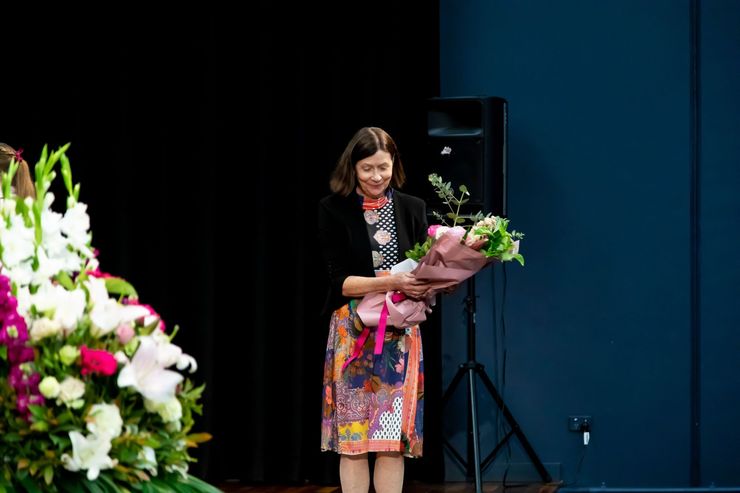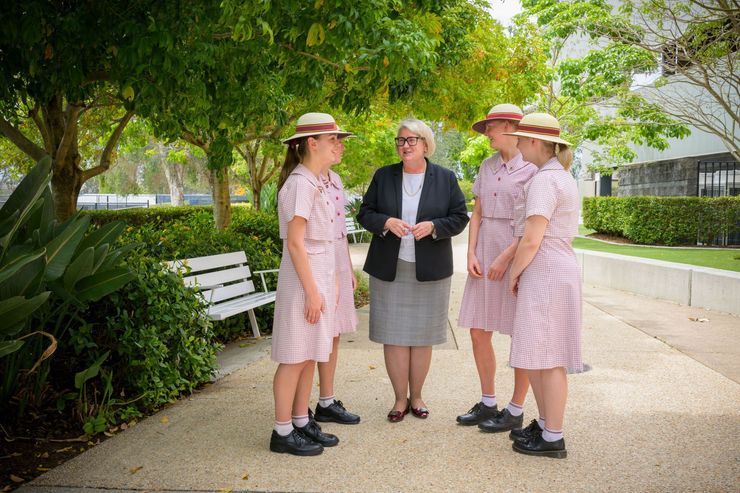Developing Exceptional People - A coaching way of being - Mrs Janet Stewart
The Moreton Bay Colleges’ Strategic Plan prioritises an outstanding student experience founded on high-quality student-focused teaching and engaged learning that achieves results.
It goes without saying that to provide such quality outcomes – quality teaching is required. Thus, it should come as no surprise that the Colleges privilege ‘developing exceptional’ staff and intentionally commit to advancing the growth and professional development of all staff at MBC. Therefore, over the last 4 years we have researched, trialled and embraced coaching as our preferred model to facilitate professional growth which will have a positive impact on student outcomes. From the development of a ‘strategy canvas’ with Growth Coaching International in 2019 – we have implemented a Coaching Model across the Colleges based upon principles of positive psychology and contemporary coaching principles.

Why Coaching?
The demand for change in education has never been greater than it is today. Schools must evolve in response to the rapid changes in technology and the influences of globalisation which impact the way we teach children for the future. Our staff are our greatest resource in preparing our girls for tomorrow’s world, and coaching enables them to explore and enhance their skills, while working towards a goal which positively affects student outcomes. At MBC, through rigorous research, we have been convinced that coaching conversations lie at the heart of excellent professional learning in schools.
Embedding a coaching culture across the College is to view coaching not merely as a technique; but as a way of being!
What is coaching?
Coaching has been found to be a highly effective method of supporting individuals and teams, in a way that is developmental, interpersonal, and customised. It is a partnership to support individuals in setting and meeting their goals, and coaching conversations are intentionally managed to employ active listening, skilful questioning and other coaching skills tempered with high levels of emotional intelligence, and trust, in order to raise awareness and encourage responsibility in the coachee. A typical coaching process involves clarifying goals, examining the current reality, exploring options, agreeing on actions, implementing these actions, and then reviewing them. This circle of deeply reflective practice for educators, ensures that coaching is a highly personalised form of professional learning that enhances not only learning within classrooms, and in teams, but even career progression.
Across the College, all teaching staff have been able to select a trained coach to work with over the course of the year. Our support staff have also been invited to opt into the coaching experience and work with 5 trained support staff coaches. Excitingly, this year our ELC staff will engage with the coaching journey, and they will be offered coaching training and conversations. In support of all our coaches, this year we have also established coaching triads so that our coaches can themselves experience coaching form a peer. In the future, we aim to explore peer to peer student coaching.
The ultimate aim of embedding a coaching culture across the College is to view coaching not merely as a technique; but as a way of being!

The Moreton Bay Colleges'’ Coaching Model
Our coaching model is multi-faceted and has evolved through a staged implementation over a number of years. Since 2018, many members of staff - from support staff to middle and senior educational leaders - have undertaken formal coaching training. There is a variety of coaching programmes run through Growth Coaching International (GCI) and in partnership with Queensland Educational Leadership Initiative (QELI) and each is aimed at meeting the specific needs of the individual and the specific context of their role. Some of these programmes have been facilitated externally by GCI but others have occurred “in-house” given the large number of participants keen to train as a professional coach.
It was fundamentally important for us to differentiate the coaching professional development offered to staff, to ensure staff felt they were trained in the most appropriate model of coaching for their role. For example, our Heads of Department have been trained using an instructional method called The Impact Cycle. This instructional coaching model was created by Jim Knight, a Research Associate at the University of Kansas Centre for Research on Learning and the President of the Instructional Coaching Group. An expert in this field, and one of the ‘wise men’ of coaching, Knight has spent more than two decades studying professional learning, effective teaching, and developing his instructional coaching model.
What is an instructional coach?
“Instructional coaches partner with teachers to analyse current reality, set goals, identify and explain teaching strategies to hit the goals, and provide support until the goals are met.” Jim Knight
For our Secondary Teachers, supportive and collaborative professional learning teams (PLTs) have been established with each team assigned a trained Instructional Coach. PLTs meet together or sometimes one-on-one with their coach, and not only is good teaching practice shared and promoted, teachers set individual goals, observe each other in the classroom and have further rich conversations exploring the data they gather to reflect on the achievement of their goals.
Instructional coaches provide what Wood and McQuarrie (1999) have described as ‘on-the-job learning’. Thus, instructional coaches respect teachers’ professionalism and focus their efforts on two-way conversations that lead to creative, practical application of research-based practices. An instructional coach may employ the following:
• conducting one-to-one or small-group meetings to identify how best to collaborate with a teacher or teachers to address their most pressing concerns about their practice
• collaboratively planning with teachers to identify when and how an intervention might be implemented in a classroom
• modelling instructional practices in teachers’ classrooms
• observing teachers using interventions
• providing feedback and inviting reflection.

Other members of staff have trained in the GROWTH model of coaching, others in Solutions Focussed Coaching and we currently have 9 fully accredited GCI professional coaches; some of whom may go forward now and undertake an international individual accreditation (EIA) with the European Mentoring & Coaching Council (EMCC).
On this important coaching journey, we have also partnered with Independent Schools Queensland (ISQ), taking part in their Great Teachers in Independent Schools (GTIS) programme. Through their ‘Developing Coaching’ and ‘Beyond Coaching’ programmes we worked with ISQ to build teacher capacity using coaching conversations and coaching approaches to target specific student needs in primary and secondary numeracy. ISQ also supported us with mentors to work alongside coaches and teachers to improve practice in specific focus areas. Such research-based projects only affirmed our belief that coaching is a fundamental professional learning skill and activity that supports more effective pedagogical delivery.
In our desire to create a sustainable model, we have built into our approach ongoing evaluation and reflection about the coaching process. Our coaches engage with ongoing refresher courses and reflective practice sessions, where they continue to hone their coaching skills. Further, over the last 2 years an end of year review has been conducted by an external facilitator, gathering quantitative and qualitative evidence in consultation with staff. This review and its recommendations have formed the basis of further iterations of the coaching model as it seeks to fulfil its goal – improving teaching practice and capacity and thus, student learning.
As John Campbell, ex-high school teacher and Founding Director of Growth Coaching International (GCI) identifies, coaching “can be viewed as a broad-based school improvement approach” and can lead schools “towards the establishment of what has been termed a ‘coaching culture for learning’ (van Nieuwerburgh 2016) and coaching ethos where coaching approaches permeate conversations across the entire school community.” (van Nieuwerburgh 2016).
The MBC Learning Star – our teaching and learning approach – affirms the primacy of curiosity, collaboration, agency, agility and reflection in a learning journey. A coaching approach demands engagement with each of these actions and so aligns perfectly with our “core purpose …to support the development of the thinking and learning processes of the professional learner.” (van Nieuwerburgh 2016)
Bibliography and References:
Aguilar, E. (2013). How coaching can impact teachers, principals and students. Retrieved from: http://www.edutopia.org/blog/coaching-impact-teachers-principals-students-elena-aguilar
Bungay Stanier, M (2016). The coaching habit: say less, ask more and change the way you lead forever. Toronto: Box of Crayons Press.
Campbell, J., & Van Nieuwerburgh, C. (2018). The leader's Guide to Coaching in Schools. California: Corwin
Knight J, (2017) The Impact Cycle: Australia : Corwin
Watterston, J, ( 2021) https://www.growthcoaching.com.au/resource/coaching-a-performance-development-approach-for-our-times/
Van Nieuwerburgh, C. (2016) Coaching in Professional Contexts. London: SAGE
Van Nieuwerburgh, C. (2017) An Introduction to Coaching Skills a Practical Guide (2nd Edition). London: SAGE


